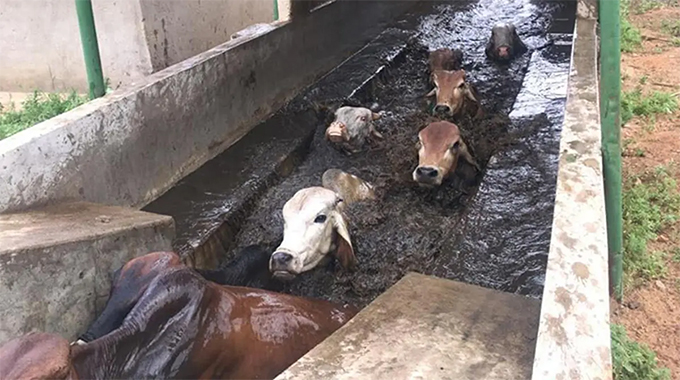Veterinary Department to construct 100 dip tanks

Precious Manomano Herald Reporter
This year the Veterinary Department is will be building 100 new dip tanks countrywide, along with rehabilitating up to 2000 damaged tanks as part of efforts to reduce the number of cattle succumbing to tick borne diseases.
Last year Government with the help of development partners had released $67 million towards dip tank rehabilitation in all provinces. The Department of Veterinary Services chief director, Dr Josphat Nyika said dip tank rehabilitation material has been delivered to all provinces for the rehabilitation of identified dip tanks.
“The rehabilitation of dip tanks is continuing as ultimately about 2000 dip tanks are earmarked to be rehabilitated. The year 2022 will see some 100 new dip tanks constructed countrywide from the budget proposals submitted to Treasury,’ he said.
He said tick-borne disease outbreaks had been gradually stabilising in the past four months.
Theileriosis commonly known as January disease has killed thousands of livestock during the rainy season in the past few years.
In the past year, January disease accounted for more than 60 percent of all the cases and deaths due to tick borne diseases,with Mashonaland West (especially Mhondoro-Ngezi) Masvingo (especially Gutu district) and Mashonaland East (especially Wedza district) being the worst affected. Matabeleland provinces have been least affected by tick borne diseases with no January diseases in the two provinces.
Dr Nyika said most provinces have now switched from the fortnightly dipping done during the dry season to weekly dipping done during the rainy season as the tick challenge is expected to rise due to the rains.
“The country has enough dip chemical in stock for weekly dipping up to the end of the rainy season but challenges include dilapidated dip tank infrastructure, low cattle turn out at dip tanks on dipping days and water challenges especially in the southern provinces of Matabeleland North and South, Masvingo and Midlands provinces,he said.
Dr Nyika said the department is doing awareness campaigns urging farmers to present their cattle at dip tanks for dipping.
“ A very worrying development is that some farmers are not presenting their cattle at the dip tanks for dipping. It is not uncommon to see engorged ticks on a cow in the areas where the dipping is happening. The reason is that some farmers are of the mistaken belief that cattle get diseases at the dip tank. This is very unfortunate. Awareness campaigns are currently on going to encourage farmers to bring their cattle to dip tanks. Cattle do not get the tick-borne diseases at the dip tanks.
“Cattle pick up ticks from grazing pastures and at the dip tanks these ticks are killed by the chemicals. If some farmers don’t bring their cattle to the dip tank, their animals will continue to drop ticks in the pastures and hence affecting others that are complying with dipping regulations,” he said.
The Animal Health (Cattle Cleansing) Regulations 1993 makes it mandatory for farmers to send cattle for dipping whenever the Department of Veterinary Services deems it necessary and farmers who do not comply are liable to prosecution. The regulations stipulate that no person shall fail or refuse to comply with a lawful instruction to dip their cattle.
On 20 November 2020, President Mnangagwa launched the Presidential Blitz Tick-grease application programme to support some 800,000 livestock farming households through supply of free tick grease packs to supplement the dipping program. The Blitz Tick grease program is now in its second year. The year 2021 saw a 47 percent reduction in tick borne disease cases.









Comments